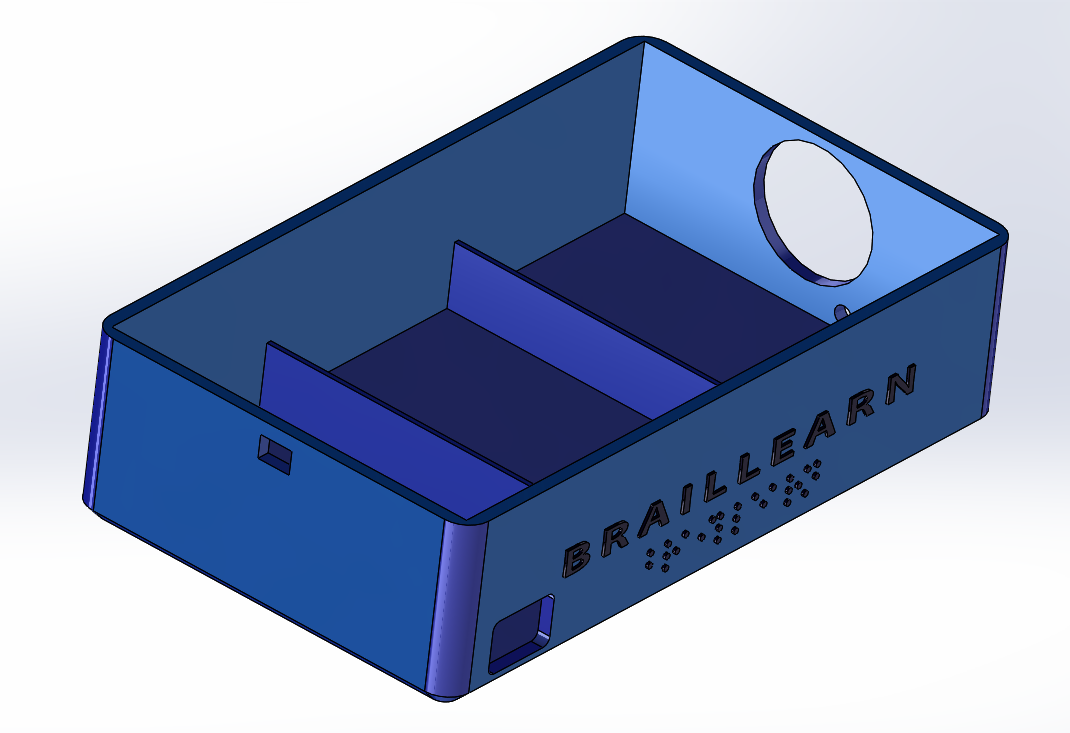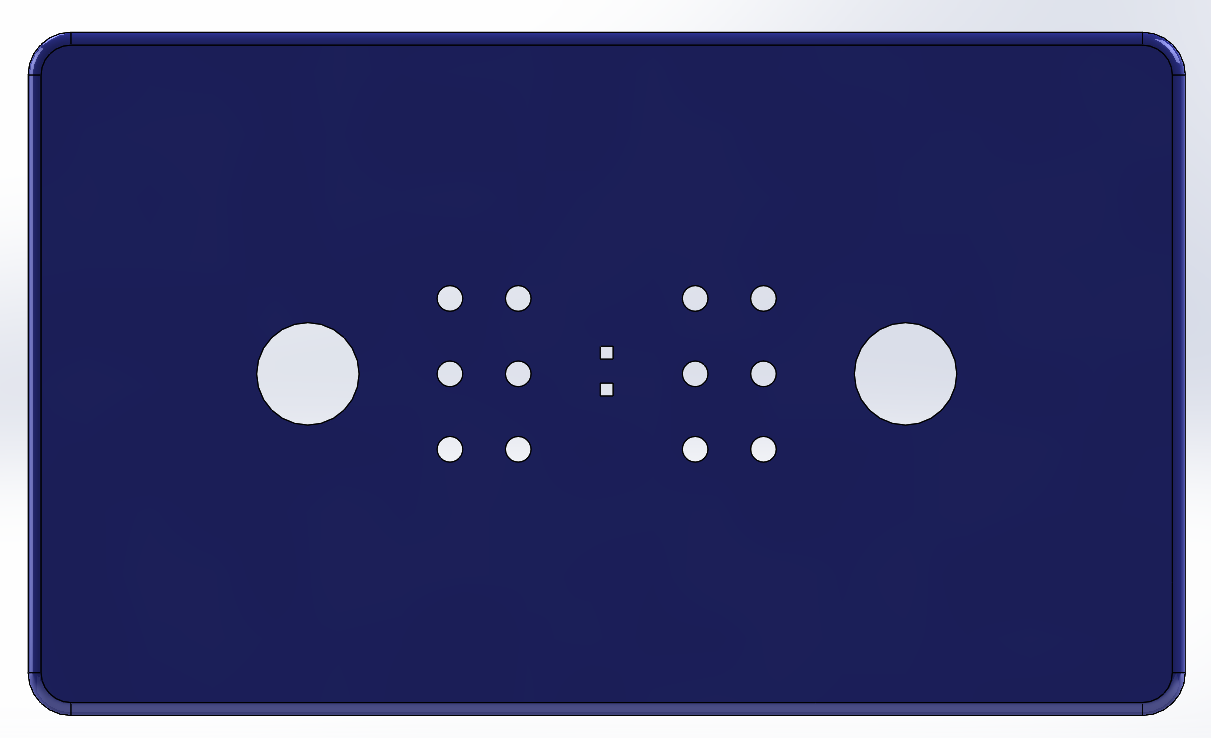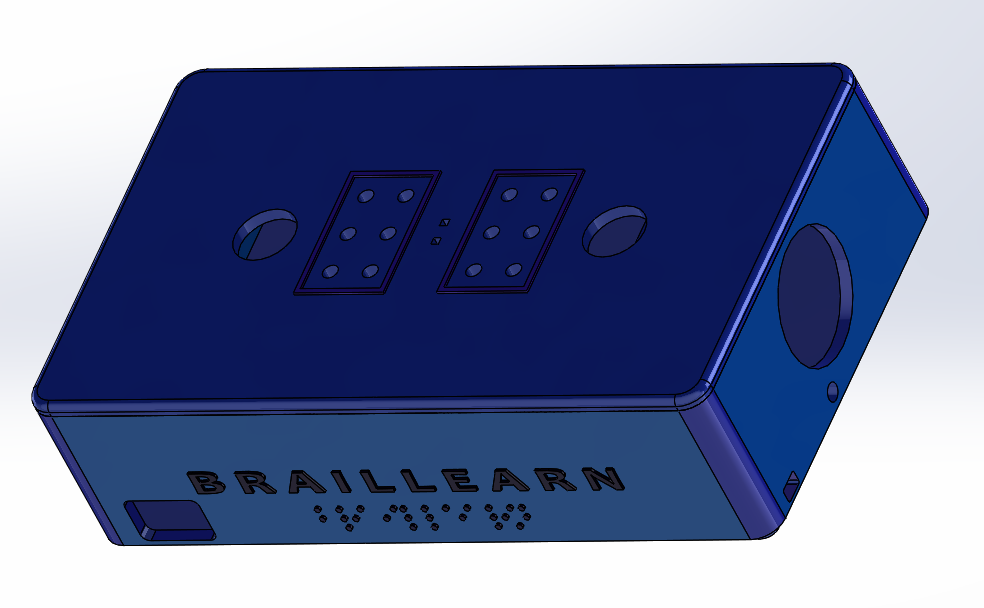PRE2019 3 Group4 SolidWorks Casing: Difference between revisions
Created page with 'The casing that will be used for the final design has been made in SolidWorks. Due to the broad available literature regarding SolidWorks, this was the most viable option. The fi…' |
No edit summary |
||
| Line 1: | Line 1: | ||
The casing that will be used for the final design has been made in SolidWorks. Due to the broad available literature regarding SolidWorks, this was the most viable option. The final design, and its subparts (case and lid), are depicted in the images | The casing that will be used for the final design has been made in SolidWorks. Due to the broad available literature regarding SolidWorks, this was the most viable option. The final design, and its subparts (case and lid), are depicted in the images on this page. | ||
In the final design, the dimensions L x W x H are much larger than the estimated dimensions for the crude approximation, namely being 220 x 110 x 75 mm. This is due to the fact that an external power supply has to be added that can deliver 7 A. Also the solenoids take much more place than estimated to reduce the total cost, since the tiny braille cells are quite expensive. | In the final design, the dimensions L x W x H are much larger than the estimated dimensions for the crude approximation, namely being 220 x 110 x 75 mm. This is due to the fact that an external power supply has to be added that can deliver 7 A. Also the solenoids take much more place than estimated to reduce the total cost, since the tiny braille cells are quite expensive due to patents. | ||
On the left side of the casing there is a small rectangular cutout where the on/off button will be place. Beneath this on/off button the external Meanwell 5 V 7 A power supply will be located. On the front of the casing there is a rectangular cutout for the input of the Meanwell power supply, namely being 230 V mains voltage. The logo, showing the brand name 'Braillearn', is also depicted on the front side, with its braille-equivalent name placed directly underneath it. With the logo spanning over the entire front side of the casing, it is very easy to make a stylish product and to create a brand. Furthermore, on the right side of the case is a small rectangular cutout for the RPi voltage input for linking the RPi to ones computer via a micro-USB cable. Also the jack plug input for the external headphones is placed beneath the large circular cutout for the speaker, such that all sound-related items are on one side of the design for simplicity. | |||
Regarding the lid of the casing, there are two large circular cutouts that will feature the reset and next button of the design. With the reset button placed on the left and the next button on the right, minor inconveniences can be avoided, since 'next' is most of the time associated with a button the furthest to the right and 'reset' vice versa. In the middle of the lid are two small rectangular cutouts that will feature the two buttons to select the mode of the Braillearn. These modes are described in more detail in the implementation section of the main page. With these small cutouts placed in the center of the lid, it is easy to locate the small buttons on the entire lid. At last 12 circular cutouts are located symmetrically around the origin, which will feature the example braille (left) and the input braille (right) keyboards. | |||
[[file:Case_Left.png|500px|thumb|The left side of the casing that will be used for the final product]] | [[file:Case_Left.png|500px|thumb|The left side of the casing that will be used for the final product]] | ||
| Line 10: | Line 12: | ||
[[file:Lid_Top.png|500px|thumb|The top of the lid that will be used for the final product]] | [[file:Lid_Top.png|500px|thumb|The top of the lid that will be used for the final product]] | ||
[[file:Case_Final.png|500px|thumb|The casing in total that will be used for the final product]] | [[file:Case_Final.png|500px|thumb|The casing in total that will be used for the final product]] | ||
[[file:Case_Final_2.png|500px|thumb|The casing in total that will be used for the final product]] | |||
Revision as of 15:12, 2 March 2020
The casing that will be used for the final design has been made in SolidWorks. Due to the broad available literature regarding SolidWorks, this was the most viable option. The final design, and its subparts (case and lid), are depicted in the images on this page.
In the final design, the dimensions L x W x H are much larger than the estimated dimensions for the crude approximation, namely being 220 x 110 x 75 mm. This is due to the fact that an external power supply has to be added that can deliver 7 A. Also the solenoids take much more place than estimated to reduce the total cost, since the tiny braille cells are quite expensive due to patents.
On the left side of the casing there is a small rectangular cutout where the on/off button will be place. Beneath this on/off button the external Meanwell 5 V 7 A power supply will be located. On the front of the casing there is a rectangular cutout for the input of the Meanwell power supply, namely being 230 V mains voltage. The logo, showing the brand name 'Braillearn', is also depicted on the front side, with its braille-equivalent name placed directly underneath it. With the logo spanning over the entire front side of the casing, it is very easy to make a stylish product and to create a brand. Furthermore, on the right side of the case is a small rectangular cutout for the RPi voltage input for linking the RPi to ones computer via a micro-USB cable. Also the jack plug input for the external headphones is placed beneath the large circular cutout for the speaker, such that all sound-related items are on one side of the design for simplicity.
Regarding the lid of the casing, there are two large circular cutouts that will feature the reset and next button of the design. With the reset button placed on the left and the next button on the right, minor inconveniences can be avoided, since 'next' is most of the time associated with a button the furthest to the right and 'reset' vice versa. In the middle of the lid are two small rectangular cutouts that will feature the two buttons to select the mode of the Braillearn. These modes are described in more detail in the implementation section of the main page. With these small cutouts placed in the center of the lid, it is easy to locate the small buttons on the entire lid. At last 12 circular cutouts are located symmetrically around the origin, which will feature the example braille (left) and the input braille (right) keyboards.





